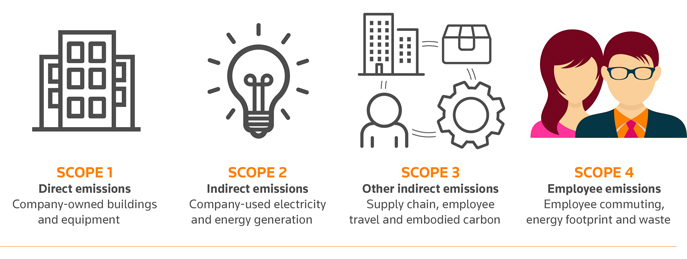COMMENT: Stephen Bay of EarthUp explains how companies that are serious about getting to net-zero must account for remote workers’ energy use
2020 has brought a number of challenges for every business, with one of the major ones being the shift to work from home. Those gleaming new corporate campuses now stand empty. Instead, workforces are scattered in apartments and single-family homes peering into Zoom calls and communicating over Slack. The challenges brought by this new work-from-home reality are numerous. However, one that is rarely considered is the challenge for sustainability directors in reporting corporate emissions. As Vaughan Lindsay, CEO of ClimateCare, pointed out recently in The Ethical Corporation, “what we have seen is that corporates run the risk of outsourcing their carbon footprints. By closing their offices, their scope 1 and 2 emissions will drop down dramatically …. But they’ve just displaced that onto individuals”, in their own homes, where the impact will be less visible.
Having everyone gathered together in offices made it easy to report emissions. After all, you knew how much energy your office used and you could report those emissions. Now, those emissions have moved from commercial real estate to being scattered across every kind of residential real estate.
In fact, according to data analysed by Sense, residential energy usage has gone up on average by 22% and midday residential energy (when people are working) usage is up by 35%. This clearly shows that the energy consumption is not going away, but is being transferred to employees and their home environments. Companies that want to maintain their roles as leaders in combating climate change must reckon with this challenge. However, as with any challenge comes the opportunity for innovation.
The shift to work-from-home hasn’t only moved emissions off the balance sheet. It’s moved employees into sick buildings
For years, companies have broken down emissions into three categories: scope 1, scope 2 and scope 3. These three scopes cover various parts of the company’s business.
The benefits of dealing with these emissions extend well beyond sustainability. Setting aside any external public relations and marketing benefits, let’s take a look at some of the benefits inside the company. According to the 2016 Cone Communications Employee Engagement Study, 76% of millennials would choose to work for a socially responsible company, even at lower pay, and 88% feel their job is more fulfilling when they are provided opportunities to make a positive impact on social or environmental issues.
A commitment to sustainability is vital to attracting the best talent. Having attracted that talent, sustainability plays a vital role in making sure that talent is as productive and engaged as possible. Sustainable buildings are healthy buildings, and help your talent perform at their best.

The shift to work-from-home hasn’t only moved emissions off the balance sheet. It’s moved employees into sick buildings in a staggering number of cases across the socio-economic spectrum,
I’ve personally conducted home energy and health assessments in the homes of Microsoft, Google and Amazon employees, and there are many health and efficiency issues that homeowners and employers are not aware of. The EPA suggests that indoor air quality is two to five times worse than outside air. Homes are often poorly ventilated, filled with mould and pests and fail to heat and cool properly. Besides causing health issues that negatively impact productivity, these issues waste employees’ money.
2020 has revealed that we need to expand how we think about corporate emissions. Stacy Smedley, director of sustainability at Skanska USA and executive director at Building Transparency, first articulated the idea of scope 4 in a LinkedIn article in June 2019. Scope 4 emissions cover every employee work-from-home activity. The pandemic didn’t create these activities, but it has expanded their scope and revealed their importance. It also reveals a tremendous opportunity to improve employee productivity, retention and engagement.
Businesses are also responsible to employees to help them understand, measure and reduce their own environmental impact
“Just like businesses are responsible for the environmental impact of the goods they’re producing, the buildings they build and occupy, or the services they provide, we are also responsible to our employees to help them understand, measure and reduce their own environmental impact,” says Smedley.
When a company supports its employees, for instance by getting solar on their homes or improving their attic insulation, they are helping their employees save money and improving the quality of life of those employees’ entire families.
Scope 4 isn’t adding another reporting requirement. It’s creating an opportunity to engage employees in ways that benefit everyone. Fortunately, in the last few years, the tools needed to measure and report these emissions have become available. There now exists a massive amount of data on everything from home energy-efficiency to the environmental impact of every product and service.

And the internet of things has given consumers affordable devices, such as the Google Nest and the Awair air quality monitor, which give individuals the chance to better monitor the health and comfort of their home environment. Knowledge is power. And with the knowledge we now have available, we can not only measure individual energy usage, air quality and more, but more importantly, connect every person in a community to actions tailor-made to their preferences.
Best of all, many of these changes in employees’ lives won’t cost companies a dime. While the government isn’t always an active partner in sustainability, there are many existing local, state and federal programmes designed to benefit ordinary citizens. Companies get to be the heroes here, too, connecting employees with incentives and rebates that have been lying unclaimed for years.
Work from home has created innumerable challenges. Let’s take advantage of its opportunities. Scope 4 isn’t just essential to honestly reporting emissions. It’s a chance to engage every member of your team and help them realise that sustainable living isn’t just better for the planet. It’s better for the health, wealth and wellbeing of every employee and their families.

Stephen Bay is a building science expert and serial entrepreneur whose mission is to accelerate the transition to a sustainable economy. His most recent startup, EarthUp, magnifies and expands the impact of corporate sustainability by connecting employers with their employees.
This article is part of the in-depth Race to net zero briefing. See also:
Calls grow for sheriff to police ‘wild-west’ of net-zero targets
Giving nature its due place in race to save the planet
Biden’s first steps spur audacity of hope for US climate action proponents
‘Great climate ambition from UK but mind the gaps,’ experts warn
‘Where’s the climate science behind continuing to bankroll coal?’ NGOs demand
How brands are joining the communications battle for more sustainable consumption
‘Investors don’t understand how much climate action is needed from companies’
GHG emissions remote working energy efficiency Sustainable buildings workingfromhome health and welfare
